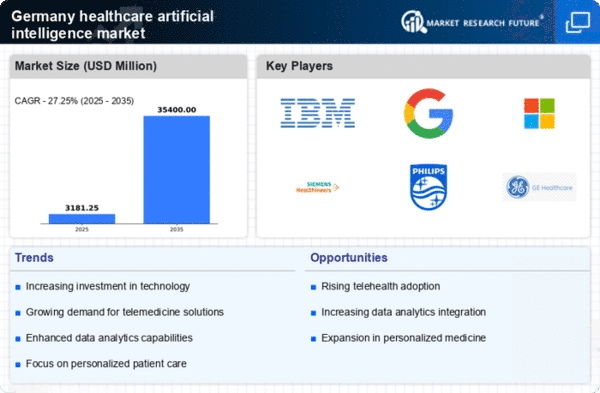Government Initiatives and Funding
The German government is actively promoting the adoption of AI technologies within the healthcare sector, which is a key driver for the healthcare artificial-intelligence market. Initiatives such as the Digital Healthcare Act aim to integrate digital health solutions into standard care practices. Furthermore, substantial funding is allocated to research and development projects focused on AI applications in healthcare. In 2025, the government is expected to invest over €200 million in AI-related healthcare projects, fostering innovation and encouraging collaboration between public and private sectors. This supportive regulatory environment is likely to accelerate the growth of the healthcare artificial-intelligence market.
Advancements in Diagnostic Accuracy
In Germany, the healthcare artificial-intelligence market is significantly influenced by advancements in diagnostic accuracy. AI algorithms are increasingly employed to analyze medical imaging and pathology data, leading to earlier and more accurate diagnoses. For instance, AI systems can reduce diagnostic errors by up to 30%, which is crucial in conditions such as cancer where early detection is vital. The integration of AI in diagnostic processes not only improves patient care but also optimizes resource allocation within healthcare facilities. This trend is expected to propel the market forward, as healthcare providers seek to enhance their diagnostic capabilities through innovative AI technologies.
Rising Demand for Personalized Medicine
The healthcare artificial intelligence market is experiencing a notable shift towards personalized medicine in Germany. This trend is driven by the increasing recognition of the need for tailored treatment plans that cater to individual patient profiles. AI technologies facilitate the analysis of vast datasets, enabling healthcare providers to develop customized therapies based on genetic, environmental, and lifestyle factors. As a result, the market is projected to grow at a CAGR of approximately 25% over the next five years. This growth is indicative of the healthcare sector's commitment to enhancing patient outcomes through precision medicine, thereby driving further investment in AI solutions.
Growing Emphasis on Operational Efficiency
Operational efficiency is becoming increasingly critical in the German healthcare system, driving the healthcare artificial-intelligence market. AI technologies are being utilized to streamline administrative processes, reduce wait times, and enhance patient flow management. By automating routine tasks, healthcare providers can allocate resources more effectively, ultimately improving service delivery. Reports indicate that AI implementation can lead to a reduction in operational costs by up to 20%, which is particularly appealing in a resource-constrained environment. As healthcare organizations strive for efficiency, the demand for AI solutions is expected to rise, further propelling market growth.
Integration of AI in Clinical Decision Support Systems
The integration of AI in clinical decision support systems (CDSS) is a pivotal driver for the healthcare artificial-intelligence market in Germany. These systems leverage AI algorithms to assist healthcare professionals in making informed decisions based on patient data and clinical guidelines. The use of AI in CDSS has been shown to improve treatment outcomes and reduce adverse events. In 2025, it is anticipated that over 40% of healthcare providers in Germany will adopt AI-enhanced CDSS, reflecting a growing reliance on technology to support clinical decision-making. This trend underscores the potential of AI to transform healthcare delivery and enhance patient safety.

















